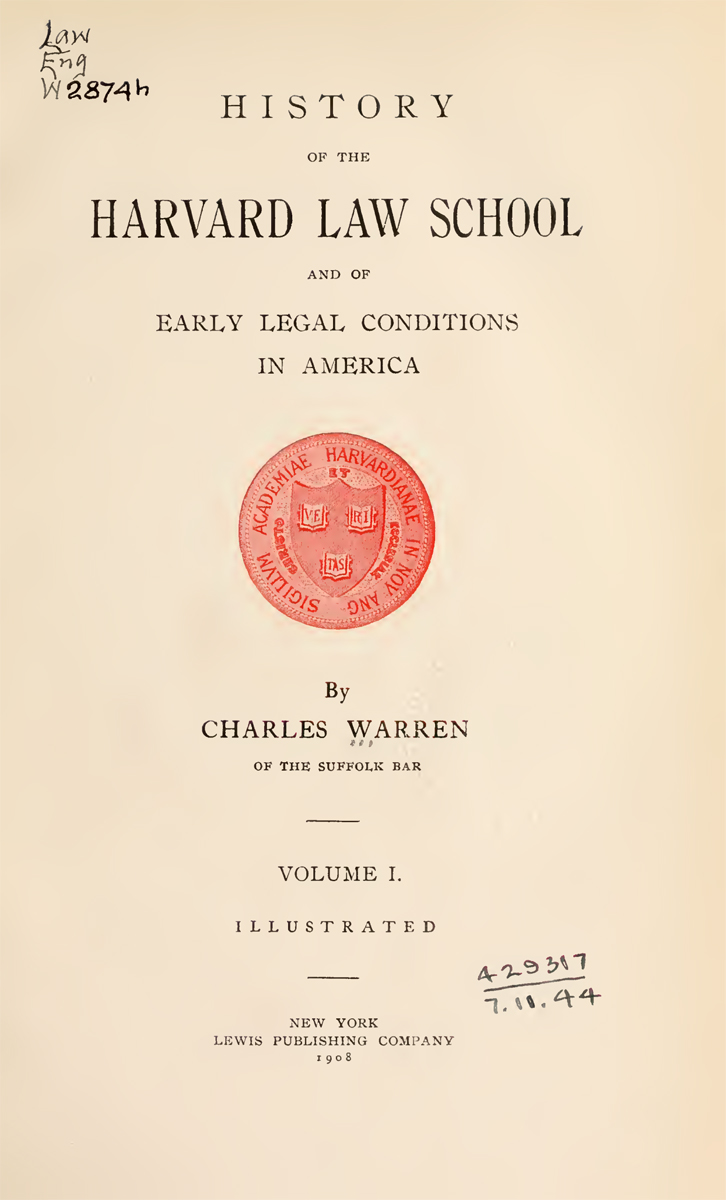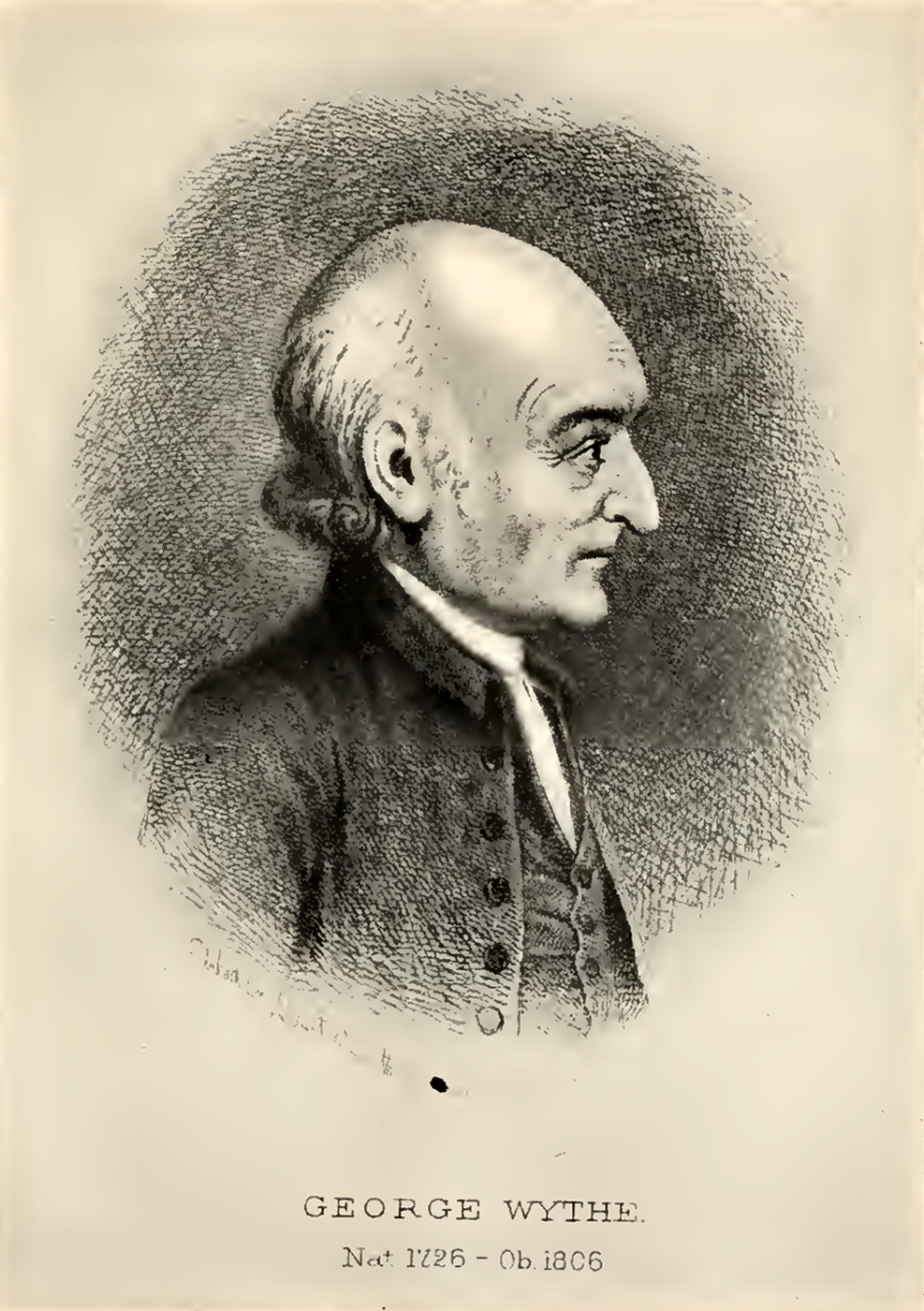History of the Harvard Law School and of Early Legal Conditions in America


Charles Warren, "Early Law Professorships," History of the Harvard Law School and of Early Legal Conditions in America.[1]
Contents
Chapter VIII text, "Early Law Professorships"
Page 169
Although the Bar of Virginia was by no means the most prominent of the Colonial Bars, the first American Law Professorship (and the second in any English speaking country), was founded at the College of William and Mary in 1779—in the year after Blackstone had published the eighth and final edition of his lectures, and a year before his death.
It was to Thomas Jefferson that the science of law owed its first collegiate professor, eighty-seven years after the chartering of the College. In his autobiography he says:
On the first of June 1779, I was appointed Governor of the Commonwealth and retired from the Legislature. Being elected also one of the visitors of William and Mary College, a self electing body, I effected, during my residence in Williamsburg that year, a change in the organization of that institution, by abolishing the Grammar School and the two Professorships of Divinity and Oriental Languages, and substituting a Professorship of Law and Police, one of Anatomy, Medicine and Chemistry, and one of Modern Languages; and, the charter confining us to six Professors, we added the Law of Nature and Nations and the Fine Arts to the duties of the Moral Professor, and Natural History to those of the Professor of Mathematics and Natural Philosophy.[2]
The following regulation was then adopted:
A student on paying annually 1000 pounds of tobacco shall be entitled to attend any two of the following professors, viz: of Law and Police; of Natural History and Mathematics; of Moral Philosophy, the Laws of Nature and of Nations, and of the Fine Arts.
Page 170
Jefferson's old friend and teacher, George Wythe (then judge in the Court of Chancery), was appointed Law Professor. One of his first pupils, in 1779-1780, was John Marshall; but, the college exercises being interrupted by the occupation of the buildings successively by the British and French, in the summer before Yorktown, Marshall's law studies came to a rapid end, and he was admitted to the Bar, after slight preparation, in the same year, 1780.(I) Among other of Wythe's students, prior to 1800, who later became distinguished lawyers, were Spencer Roane, Marshall's rival at the Virginia Bar; Benjamin Watkins Leigh, John J. Crittenden, William A. Rives, Alexander Campbell, John Breckenridge, John Wickham, H. St. George Tucker, W. H. Cabell, and L. W. Tazewell.
"Wythe, above all early statesmen, was deeply learned in the law; had traced all its doctrines to their fountain heads, delighted in the year book, from doomsday down; had Glanville, Bracton, Britton, and Fleta bound in collects; had all the British Statutes at full length, and was writing elaborate decisions every day, in which, to the amazement of county court lawyers, Horace and Aulus Gellius[3] were sometimes quoted as authorities."(2)
"He carried his love of antiquity rather too far, for he frequently subjected himself to the charge of pedantry; and his admiration of the gigantic writers of Queen Elizabeth's reign had unfortunately betrayed him into an imitation of their quaintness—Yet, he was a man of great capacity, powerful in argument, elegantly keen and sarcastic in repartee—long the rival of Mr. Pendleton at the bar, whom he equalled as a common lawyer and greatly surpassed as a civilian. . . . No man was ever more entirely destitute of art . . . This simplicity and integrity of character sometimes exposed him to the arts and sneers of the less scrupulous—but he was not only pure, but above all suspicion."(3)
(I) American Historical Association Papers, Vol. IV.[4]
(2) Discourse on Life and Character of Littleton Waller Tazewell, by Hon. Hugh Blair Grigsby (1830).
(3) Sketches of the Life of Patrick Henry, by William Wirt (1817).
John Randolph said of him, "he lived in the world without being of the world; that he was a mere incarnation of justice—that his judgments were all as between A and B; for he knew nobody; but went into court, as Astraea was supposed to come down from heaven, exempt from all human bias."[5]
See especially The Supreme Court of Appeals in Virginia, Green Bag, Vol. V.
Page 171
- Main article: Jefferson-Tyler Correspondence
The quality of Judge Wythe's lectures may be estimated by the following opinion of Judge Roane, expressed regarding a manuscript copy of these lectures, in a letter from Governor John Tyler written to Jefferson, in 1810:
Judge Roane has read them, or most of them, and is highly pleased with them, thinks they will be very valuable, there being so much of his sound reasoning upon great principles, and not a mere servile copy of Blackstone and other British Commentators—a good many of his own thoughts on our constitutions and the necessary changes they have begotten, with that spirit of freedom which always marked his opinions.(I)
The following interesting sidelight on this Professorship of Law is found in President Stiles' diary, June 8, 1784(2):
His Excellency, Gov. Jefferson of Virginia visited me with a letter from Mr. (Roger) Sherman at Congress. . . . He was educated at and entered Wm. & Mary Coll. 1761, where he studied five years, and left in 1766. Then became a Lawyer. He was one of the 24 visitors of Wm. & Mary Coll. . . . The salaries of the professors were £80 in Tobacco, now worth £150 or £160, the price of tobacco has doubled. The Professors besides their salys. have about £8 in Tobacco, now £12 or £15, from each scholar per ann. for Instruction. There are Eighty Undergraduates Students at present. . . . The Professor is
(I) The rest of the letter is of interest. It is not known if the lectures referred to are in existence now or not.
"Perhaps Mr. Ritchie before this time has informed you of his having possession of Mr. Wythe's MSS. lectures delivered at William and Mary College while he was professor of law and politics at that place. They are highly worthy of publication and but for the delicacy of sentiment and the remarkably modest and unassuming character of that valuable and virtuous citizen they would have made their way in the world before this. It is a pity they should be lost to society and such a monument of his memory be neglected. As you are entitled to it by his will (I am informed) as composing a part of his library, could you not find leisure time enough to examine it and supply some omissions which now and then are met with, I suppose from accident, or from not having time to correct and improve the whole as he intended.
I do not see why an American Aristides should not be known to future ages. Mr. Wm. Crane gave it to Mr. Ritchie who I suppose got it from Mr. Duval who always had access to Mr. Wythe's library and was much in his confidence."
See Letters and Times of the Tylers, by Leon G. Tyler [sic], Vol. I.[6]
(2) See Literary Diary of Ezra Stiles, Vol. III, p. 124, (1901). Thomas Jefferson had been introduced to Stiles by Roger Sherman in the following letter dated Annapolis, May 11, 1784.
"I take the liberty to introduce to you the Honorable Thomas Jefferson, Esqr. . . . He is a Gentleman of much philosophical as well as political knowledge—and I doubt not you will be very agreeably entertained with his conversation."
Page 172
the Att. Gen. of the State and he makes more by his Professorship than as Attorney. . . . The Gov. is a most ingenious Naturalist and Philosopher—a truly scientific and learned man —and every way excellent . . . . Blackston is the Basis of Law Lect. in Wm. & Mary Coll., Philosophy, Medicine and Law seem to be their object.
Wythe resigned his professorship in 1800, and the chair was filled by St. George Tucker, whose lectures became the basis of his famous edition of Blackstone, published in 1803, and containing his commentaries on the Federal Law and Constitution. It was not until 1824, however, that the College conferred any degree of LL.B.
See also
References
- ↑ Charles Warren, "Early Law Professorships," History of the Harvard Law School and of Early Legal Conditions in America, (New York: Lewis Publishing, 1908), 1:169-172.
- ↑ Thomas Jefferson Randolph, ed., Memoir, Correspondence and Miscellanies from the Papers of Thomas Jefferson (Charlottesville, VA: F. Carr, 1829), 1:40-41.
- ↑ Wythe owned copy of Aulus Gellius' Noctes Atticae (the "Attic Nights"), probably a 1651 edition translated by Jacob Gronovius, which is recorded in Jefferson's Inventory as being given to Thomas Jefferson Randolph. The copy has not survived.
- ↑ Lyon G. Tyler, "A Few Facts from the Records of William and Mary College," Papers of the American Historical Association, 4, no. 4 (October 1890), 129-141.
- ↑ Letter from Beverly Tucker to B.B. Minor, in "Memoir of the Author," Wythe's Reports (1852), p. xxv.
- ↑ Lyon Gardiner Tyler, Letters and Times of the Tylers (Richmond, VA: Whittet and Shipperson, 1884).
External links
- Read this book in Google Books.